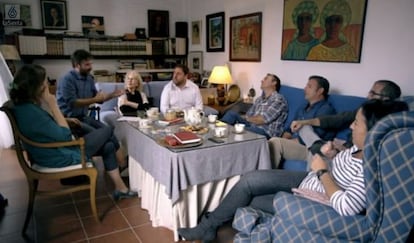A Catalan secessionist heads to the Spanish heartland
Pro-sovereignty leader Oriol Junqueras puts his arguments to Seville family for TV show

In his bid to become the regional premier of Catalonia, Catalan Republican Left (ERC) leader Oriol Junqueras has always sought to portray himself as different from your average politician.
The strategy has brought his influential party to the brink of election victory after experiencing a major crisis in 2010.
With ERC in the limelight as a result of the Catalan independence drive and the possibility of early elections in the region, which could prove highly favorable for the party, a popular Spanish investigative TV program decided to create an unlikely scenario: it would take Oriol Junqueras, a leading figure of the Catalan secession movement, and plonk him in the middle of Andalusia – the land of bulls, flamenco, horses and other classic symbols of Spanishness.
Junqueras took up the challenge and joined presenter Jordi Évole on Salvados – the La Sexta program perhaps best known for its influential report about the 2006 Valencia metro accident that killed 43 people and left 47 others injured – for the first episode of the new season.
So everything Spanish is bad and everything Catalan is good? Surely it’s half and half?”
Antonio Parejo
With a backpack slung over his shoulder and showing off his knowledge of Spanish history, Junqueras arrived in Seville to convince people that secession would not lead to a traumatic break-up.
As he arrived at the airport, people began questioning him about the emotional effects of a separation. “We want to keep being neighbors but to make our decisions at home,” Junqueras told one woman.
Asked by someone else why he saw no negatives about independence, as if Catalonia never did anything wrong, Junqueras’ reply was: “We want to be responsible for what we do well and for what we do wrong.”
From the airport, Junqueras was whisked to the home of the Parejos family whose matriarch, Eugenia, handed him a book of poetry by one of Spain’s foremost writers, Antonio Machado.
“Ah yes, I have quoted him in the regional parliament on several occasions,” responded Junqueras.
Eugenia expressed her regret that the Spanish prime minister had refused to yield any ground to Catalonia when it had earlier requested greater financial powers .
“If [Mariano] Rajoy had sat down to talk with [Catalan leader Artur] Mas before the whole November 9 referendum decision, there would be fewer supporters of independence today,” he agreed.
The matriarch handed him a book of poetry by one of Spain’s foremost writers, Antonio Machado
But the rest of the family was less lenient. Antonio, an agricultural engineer, took Junqueras to task for seeing only good things in independence: “You refuse to accept any negative sides. So everything Spanish is bad and everything Catalan is good? Surely it’s half and half?”
But Junqueras, who refuses to accept that independence could turn out badly, said that an independent Catalonia would manage its own finances better and that this would even be for the good of Spain, because improved economic output in Catalonia would ultimately benefit Spanish companies doing business with the northeastern region.
But his arguments failed to convince the family, which asked for more government-level talks to resolve the situation.
Junqueras, however, said that “experience shows that dialogue is useless” and that if he wins the elections, he would declare independence and hold a referendum to ratify it.
“That would make me very sad,” said Eugenia.
“I understand. I am very saddened to hear that the citizens of Catalonia don’t have the right to decide,” replied Junqueras.
After admiring the family garden, in particular Eugenia’s vegetable patch, the Catalan politician promised to return to Andalusia one day – but only after Catalonia becomes independent.
Tu suscripción se está usando en otro dispositivo
¿Quieres añadir otro usuario a tu suscripción?
Si continúas leyendo en este dispositivo, no se podrá leer en el otro.
FlechaTu suscripción se está usando en otro dispositivo y solo puedes acceder a EL PAÍS desde un dispositivo a la vez.
Si quieres compartir tu cuenta, cambia tu suscripción a la modalidad Premium, así podrás añadir otro usuario. Cada uno accederá con su propia cuenta de email, lo que os permitirá personalizar vuestra experiencia en EL PAÍS.
En el caso de no saber quién está usando tu cuenta, te recomendamos cambiar tu contraseña aquí.
Si decides continuar compartiendo tu cuenta, este mensaje se mostrará en tu dispositivo y en el de la otra persona que está usando tu cuenta de forma indefinida, afectando a tu experiencia de lectura. Puedes consultar aquí los términos y condiciones de la suscripción digital.








































